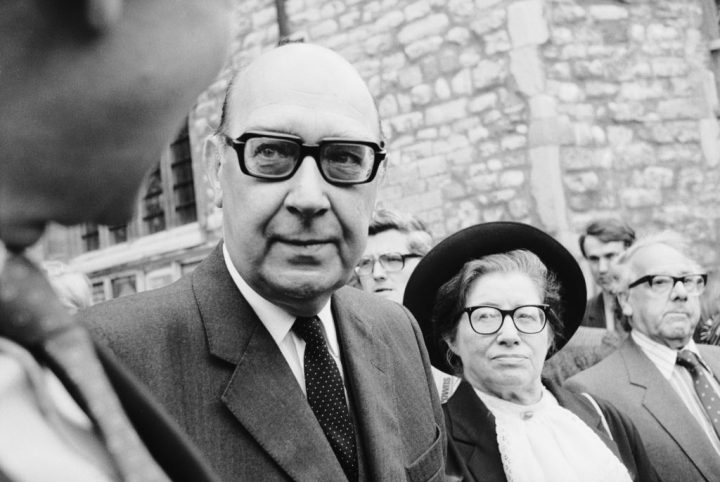We’ll never know if Philip Larkin, one of the greatest English poets of the twentieth century, would have been a success as Poet Laureate. Larkin, as well as several other poets like WH Auden and Robert Graves, was deemed unsuitable for the role by Downing Street, according to documents released today by the National Archives. No. 10 was warned that Larkin disliked public speaking and that he was a ‘reserved’ man who would not be an ambassador for poetry.
While there is no doubt of Larkin’s talent, this is no guarantee that he would have succeeded as Laureate. Twenty men and one woman have been appointed Poet Laureate. Probably only three of those have been a complete success. The poet has to be able to take on public subjects, and not just produce intimate inward lyrics. The style has to be accessible to a wide readership, even to have a quality of the tub-thumping – William Blake and Geoffrey Hill wrote magnificently on national themes but would have been too cryptic. And, most demandingly of all, the laureate ought to be a great poet, and still be writing great poetry, if he or she can manage it.
It was always understood that Larkin declined the offer, but these papers suggest someone objected to him
The three great ones are, first, John Dryden, who wrote in an age when poetry found it easy to engage with national subjects. Secondly, there was Alfred, Lord Tennyson, who was appointed at the height of his powers. Much of his greatest poetry was written after his appointment; he was also capable of a stupendous public grandeur which seized the nation’s ear, as in the ‘Charge of the Light Brigade’, the Wellington funerary poem, or the rapturous ode on the marriage of the Prince of Wales.
The third great poet in the role was Ted Hughes, who believed fervently in the ideas of kingship, nationhood and the laureate’s role. His style, epic, mythic but richly specific, produced some sublime poetry in his official capacity. One of his greatest poems, the overwhelming ‘Rain-charm for the Duchy’ was commissioned for no more dignified a purpose than the birth of Prince Harry.
Hughes’s triumph lay somewhat in the future in 1967, when the post was left vacant by John Masefield’s death. The prime minister, Harold Wilson, must have been keen not to reproduce the embarrassing gap after Tennyson’s death, when four years had elapsed before the party hack Alfred Austin was put in place. His wife, Mary, was a delicate and honourable poet, a bit better than an amateur; she must have taken an interest. Views on likely successors were canvassed.
It’s interesting evidence of how much poetry still matters that only now are these papers, from 1967 to the early 1980s, being released. Someone must have judged them too hot for routine release. In any case, Dame Helen Gardner, the Oxford professor, was consulted, and the chair of the Poetry Society. The reasons they give for ruling poets out, in 1968 and five years later, when the laureateship again fell empty, show just how far the practice of poetry had come from the requirements of the post. Philip Larkin was too reserved – it was always understood that he declined the offer, but these new papers suggest someone objected to him.
WH Auden would have been superb, but he was an American citizen by now. Also, No. 10 was alerted by Ross McWhirter to the existence of a pornographic poem by Auden, in a very Audenesque recherché metre, but inexcusably filthy. (‘I inspected his erection. I surveyed his parts with a stare/From scrotum level.’) Could he be trusted with the task of an ode on the Queen Mother’s 70th birthday? (‘The Platonic Blow’ is still too much to be included in the Collected Poems).
Stevie Smith was too little-girl; John Betjeman too tennis-lawns in 1968 but not in 1972. Robert Graves ruled out by his ‘manner of life’, mysteriously. By this point Wilson must have been dreading any more candidates, and eventually fell on Cecil Day-Lewis with relief. The worst anyone could say about him was that he was ‘run-of-the-mill’.
The moral of the whole, rather comic story, is that by the 1960s the congenitally idiosyncratic nature of poets had mostly separated them from the orthodox opinions of the state. Only mostly, however: a couple of the most incorrigible rebels had spotted that a new crushing orthodoxy had begun to arise, an orthodoxy of conventional rebellion. In the years to come, Philip Larkin, and Ted Hughes created a new outrageousness, insulting the conventional pieties. Larkin said: ‘Oh, I adore Mrs Thatcher – at last politics makes sense to me’. Hughes unaffectedly loved crown and country. It was outrageous, and, for once, just the thing.
The delicate alignment of official opinion and idiosyncratic poetic spirit only comes around once in a while; it happened in 1850, with Tennyson, and it happened in 1984, with Hughes. For the rest of it, we should expect what happened in 1967: a willingness to insult and offend in one side, a blank incredulity on the other. Perhaps that’s the way it’s meant to be.






Comments